|
47 Sturry Road (near Vauxhall)
Northgate
Canterbury
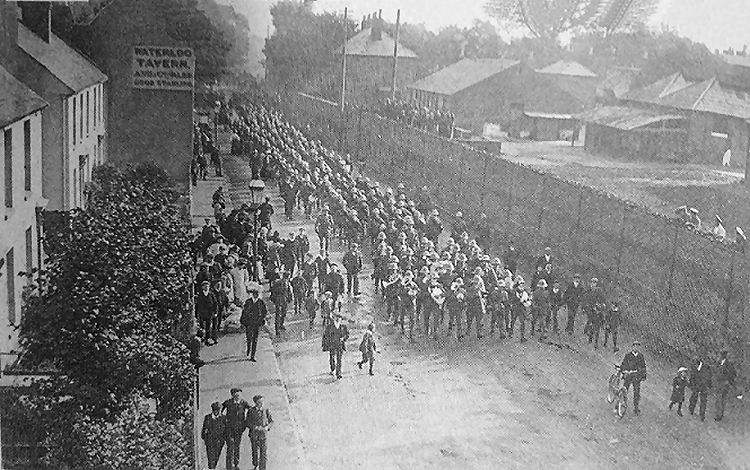
"Soldiers of the 7th Dragoon Guards, stationed at the Cavalry Barracks
on Sturry Road, marching to the West Station en route for Egypt" in
1908. Cavalry Barracks were opposite "Vauxhall
Tavern." These troops are marching past the infantry's St. Gregory's
Barracks. Kindly sent by Rory Kehoe. |
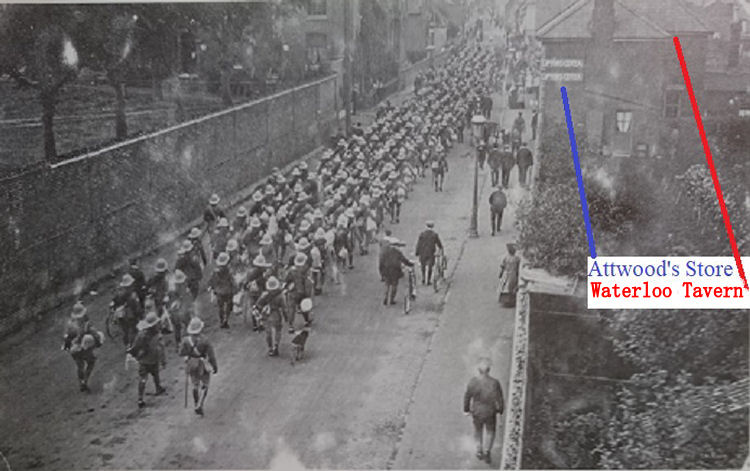
Above photo, 1908, kindly sent by Rory Kehoe.
Caption states that "...Lt. Col. Bernard R Dietz leads the 7th
Dragoon Guards to the West Station en route to Egypt. On the left is
part of the Cavalry Barracks and on the right is the Vauxhall Tavern and
Henry Attwood's general shop..." |
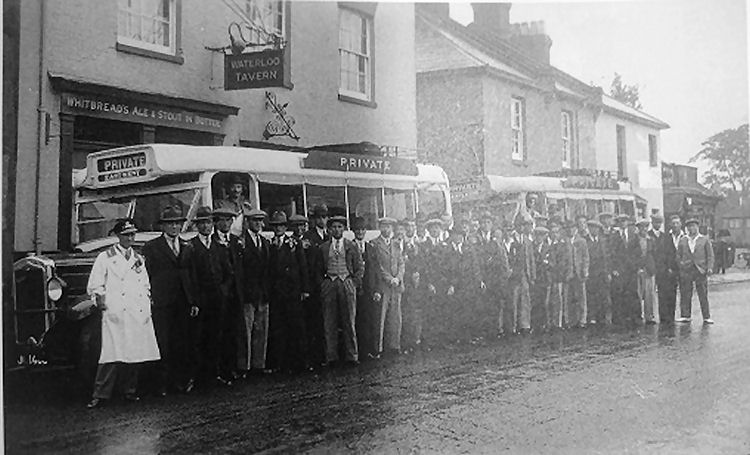
Above photo, circa 1950, kindly sent by Rory Kehoe. |
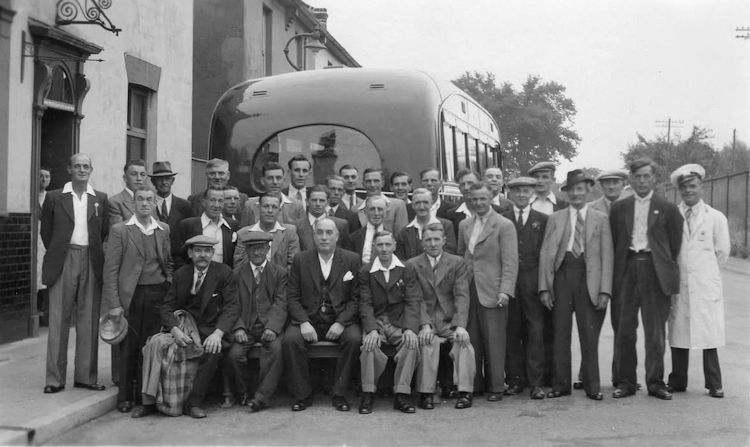
Above photo, date and names unknown. |
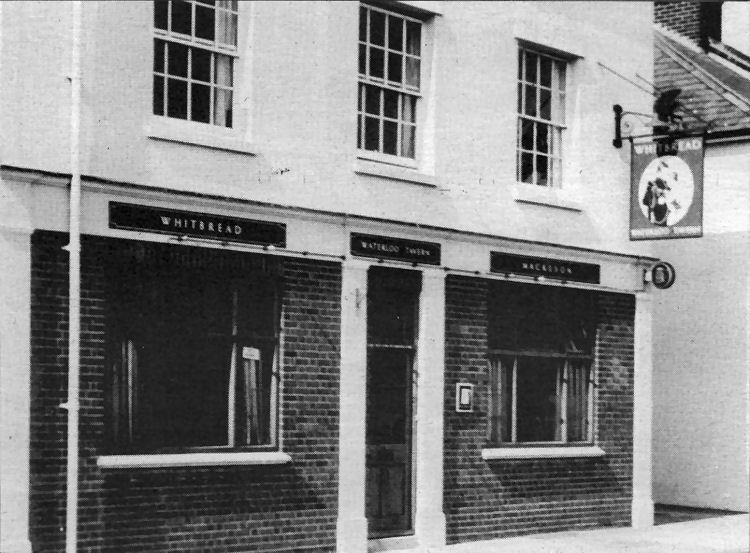
Above photograph by Edward Wilmot in 1965. |
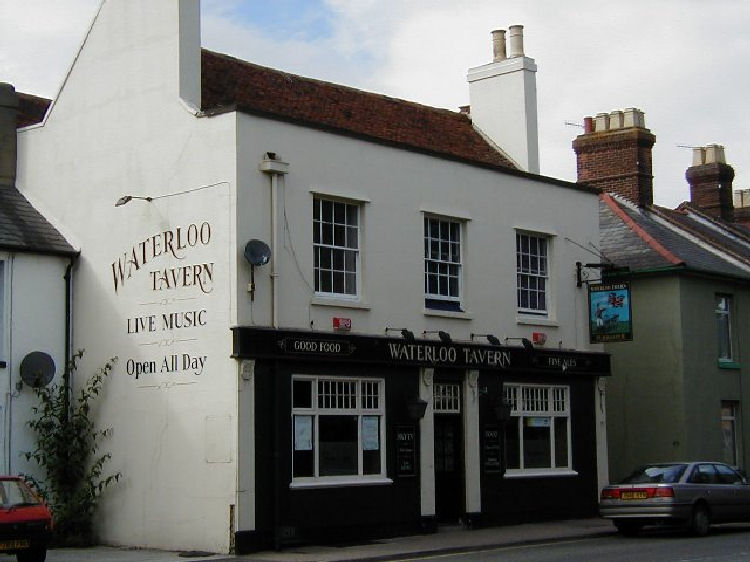
Above photo July 2001. |
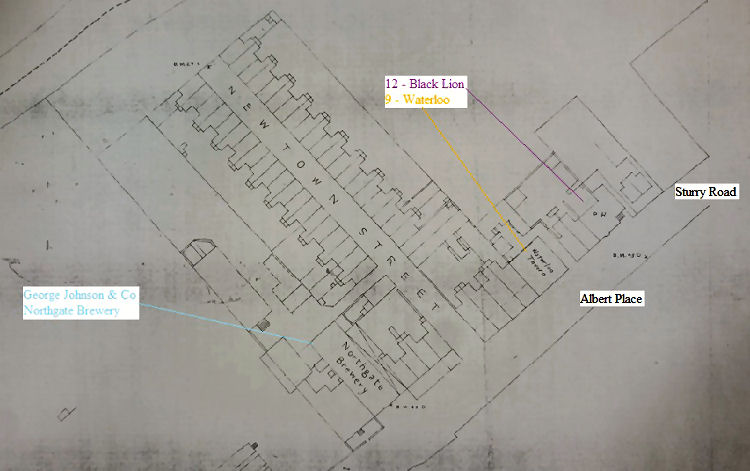
Above map 1874, kindly send by Rory Kehoe. |
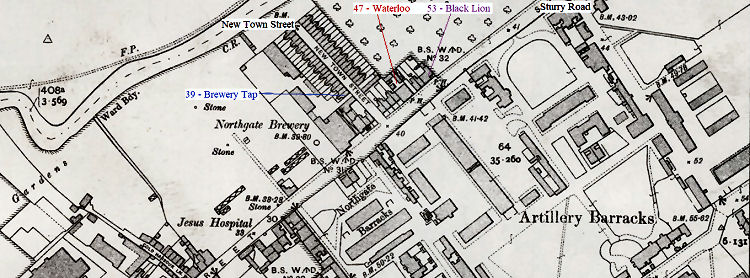
Above map 1905, kindly sent by Rory Kehoe. |
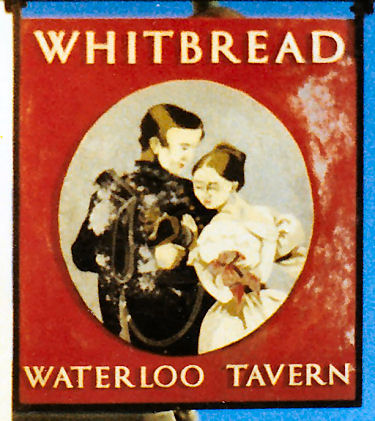 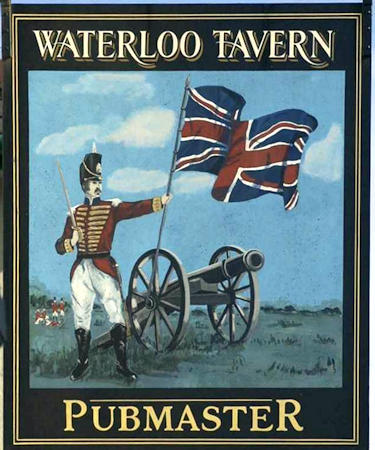
Waterloo Tavern sign left December 1986. Above with thanks from Brian Curtis
www.innsignsociety.com. Sign right, date unbknown.
|
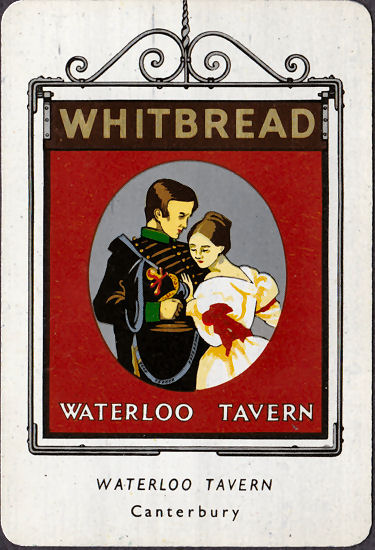 Above aluminium card issued
June 1951. Sign series 3 number 40. |
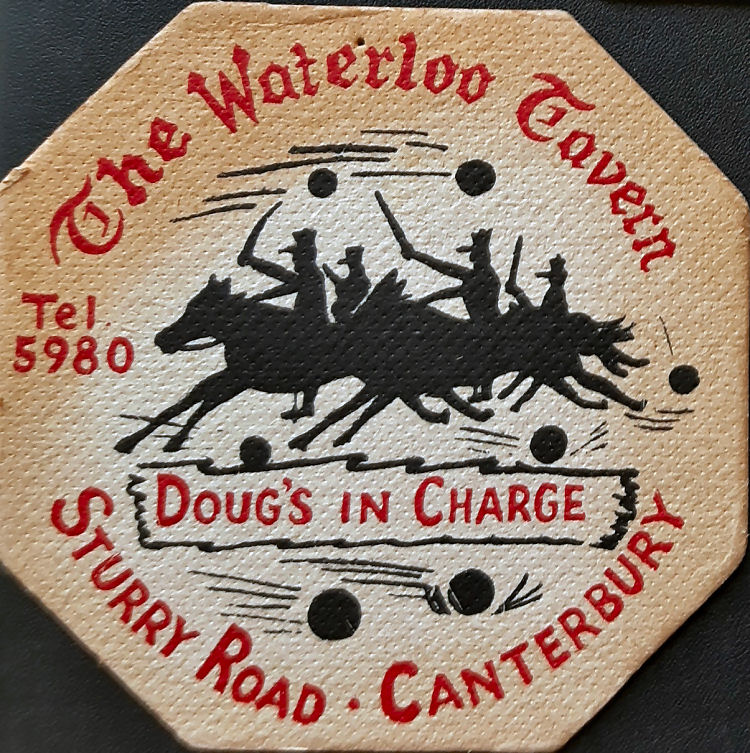
Above beermat 1960s, kindly sent by Mike L. |
This one has caused a bit of confusion in the past, having seen this also
addressed as 9 Albert Place as well as 47 Sturry Road. However, with them
both being in the Northgate area, I am going to say they are the same,
although I cannot find Albert Place ion the map today. (Local knowledge
needed here.) The other pub in Albert Place being the "Black Lion"
at number 12.
The premises has been dated as 1812, three years before the Battle of
Waterloo. The original name being the "Ordance
Arms." The building is definitely mentioned as the "Waterloo Tavern" in
a directory of 1838, so must have changed name between 1815 and 1838.
It was said around 1988 to be frequented by local residents and soldiers
The premises again changed name to "Saxby's"
after 1986 and more previously circa 2010 to
the "Run of the Mill."
|
From the Kentish Gazette, 25 October 1836.
DEATH FROM DROWNING.
An inquest was held on Tuesday morning last, at eleven o'clock, at the
"Waterloo Tavern," Northgate, before T. T. Delasaux and a respectable
jury, touching the death of Sarah Bates, whose body was found at an
early hour that morning, in the head water at the Old Barton Mill. The
jury proceeded to view the body, which lay in an out-house near the
fatal spot. There were no marks of violence discovered that would lead
to a suspicion that the deceased had been ill-treated.
It appeared from the testimony of Richard Nash, a miller, that on going
to work in the morning, his attention was called to the deceased by a
boy on the premises. He proceeded to the spot pointed out, and with the
assistance of a fellow-workman, succeeded in getting her ont of the
water. The deceased was perfectly upright against the wooden grating
which is erected for the protection of the mill-wheel. He further stated
that about twelve o'clock the preceding night, a portion of the grating
gave way, passed under the wheel, and damaged the floats. He thought it
possible that the deceased in her straggles might have detached a piece
from its fastening.
James Stewart, a tailor, a private in the 38th regiment of foot,
identified the body. The deceased had followed him from Chatham, and had
been living in the New Military Road. He had occasionally supplied her
with money. From what he had heard her say, he believed she had been
married, and had had four children, who, with her husband, were dead.
Rebecca Knott, residing in the New Military Road, deposed, that the
deceased had lodged with her for a period of nine weeks. She last saw
her between seven and eight o’clock on Monday evening. She left her for
the purpose of "going down town." Latterly, the deceased had been unable
to do any sowing work, in consequence of a severe inflammation of the
eyes; and her poverty, in consequence, was so great, that she had been
without food for days, with the exception of a little supplied by
herself and neighbours. During the whole of Monday she wept bitterly,
and said she did not know what to do for victuals.
This being the whole of the evidence, the jury unhesitatingly returned a
verdict of "Found Drowned," at the same time observed upon the imperfect
state of the railing intended for the protection of foot passengers, and
expressed a hope that the proprietor would make such alteration as would
ensure safety.
The deceased was a remarkably fine made woman. It was stated by Stewart
that she was well known at Rochester, in which neighbourhood her friends
reside. On her person were found eighteen duplicates, four halfpence,
and sixpence, and a gold wedding ring.
|
|
Canterbury Weekly, 22 October, 1836.
Coroner's Inquest.
An inquest was held on Tuesday morning last, at 11 o'clock, at the
"Waterloo Tavern," Northgate, before T. T. Delasaux and a
respectable jury, touching the death of Sarah Bates, whose body was
found at an early hour that morning, in the headwater at the Old
Burton Mill. The jury proceeded to view the body, which lay in and
out house near the fatal spot. There were no marks and violence
discovered that would lead to a suspicion that the deceased had been
ill treated.
James Stewart, a tailor, a private in the 58th Regiment of Foot,
identified the body. The deceased had followed him from Chatham, and
had been living in the New Military Road. He had occasionally
supplied her with money. From what he had heard her say, he believed
she had been married, and had had four children, who, with her
husband, were dead.
Rebecca Knott, residing in the New Military Road, deposed, that the
deceased had lodged with her for a period of 9 weeks. Her poverty
was so great, that she had been without food for days, with the
exception of a little supplied by herself and neighbours. During the
whole of Monday she wept bitterly, and said she did not know what to
do for victuals.
This being the whole of the evidence the jury unhesitatingly
returned the verdict of found "Found Drowned."
The deceased was remarkable fine made woman. It was stated by
Stewart, that she was well known in Rochester, in which
neighbourhood her friends reside. On her person were found 18
duplicates four half-pence, and six-pence, and a gold wedding ring.
|
|
Kentish Gazette, 21 October 1851.
Stealing a Horse and Cart.
William Mark Anthony, 17, carver and guilder's apprentice, for stealing
a gelding and cart, value £9, the property of William Toop, on the 19th
September, at Minster, in Thanet.
Mr. Burrow prosecuted. The prisoner was undefended.
The prosecutor deposed that on the day named in the indictment the
prisoner called at his house, and said he wished to stop for three days,
upon the recommendation of his (prosecutor's) sister. He had dinner, and
then enquired if there was any conveyance to have an hour’s ride round
the village. I lent him my pony and cart for that purpose. He left about
four, and did not return. I then made enquiry, and traced him to
Canterbury, where I found my horse and cart at the "Waterloo"
public-house, having previously ascertained that the prisoner had passed
through Chatham. My name was scratched off the cart.
The landlord of the "Waterloo Tavern," Canterbury, said the prisoner
came to his house with a pony and cart about six on the 19th September.
After having his tea and engaging a bed for the night, he said he had a
nice pony, and asked what it was worth. I said about £4. He then said,
will you sell it for me. I said I would not. He then stated that he had
two hunters, and some luggage with his servants coming from Ramsgate;
and that he would stop with me six months. Afterwards, he inquired for a
person to lake the cart back to Ramsgate, and said that he would give me
the pony for my trouble. He left about 10, and I did not see him again.
Cross-examined by prisoner:- You asked for a boy to take the cart back
to Ramsgate, and that you would make me a present of the pony.
John Piper deposed to the name being scratched from the cart, and the
prisoner saying he thought he should part with the pony.
The constable took the prisoner into custody at a Priest's house at
Minster. He told the prisoner what he was charged with. He said the
constable was mistaken, and that he (prisoner) was a gentleman, and if
he persisted in taking him into custody, he should bring an action
against him.
The prisoner made a rambling statement in defence, the only points in
which were, that the landlord pressed him to have the pony and cart
without naming any specific time, and that it was his intention to send
the property back to the prosecutor, but was prevented from not being
able to net a person to go to Minster for that purpose.
The Chairman told the jury that the only point for their consideration
was whether the prisoner borrowed the horse and cart with the intention
of appropriating them to his own purposes.
The jury found the prisoner guilty, and he was sentenced to six mouths'
imprisonment, with hard labour.
The Court then adjourned.
|
|
Kentish Gazette, 12 October 1852.
Coroner's Inquest.
An inquest was held on Tuesday evening last, at the "Waterloo
Tavern," Northgate-street, by Mr. T. T. Delasaux on the body
of Thomasine Walker, widow, aged 70 years, which had been taken out
of the River Stour in the eel traps at Harton Mill early that
morning. By the evidence before the coroner and jury, t appeared
that deceased resided with her son-in-law in North
lane, and that on the evening of Monday, between seven and eight
o'clock, she left the house to fetch some potatoes, which
had been taken to a hop oast in St. Radigund's-street to roast, the
nearest road to which, from her residence, is over the
"causeway" between Deane's and Abbott's Mills. She arrived safe to
the oast, and remarked to the hop-drier the difficulty she
had in crossing the causeway from the blustering state of the
weather, at which time it rained hard, and the wind was very
high. She procured part of the potatoes, the remainder not being
quite done, and left on her return home, from which time
she wan not seen alive. Her long absence creating surprise to her
son and daughter, the former, a labourer in the employ of
Mr. Cannon, repaired to the oast, and having ascertained the above
facts, information was given to the police, and every
exertion was set on foot to discover her, or to ascertain if she had
fallen into the river, as the sequel proved too fully to be the
fact. Further evidence was given by the female, who attended the
body after it was taken out of the river, showing that it
bore no marks of violence, and a verdict, justified by the above
evidence, of "Accidental death by drowning" was returned.
Deceased had been twice married; her first husband, J. Steel, or the
parish of Sturry, died some years since a violent death
through the instrumentality of a scythe.
|
|
From Lloyds weekly Newspaper, 23 April, 1854.
MANSLAUGHTER BY A POLICEMAN.
Considerable excitement has prevailed in the parish of Sturry, a small
village adjacent to Canterbury, owing to a report being generally
circulated in the neighbourhood that a woman of the name Eliza Holmes,
the wife of a labouring man, had died from the effects of fright caused
by Superintendent William Walker, of the St. Augustine's division of
Kent constabulary. Accordingly an inquest was holden on the body of the
deceased woman, before Mr. S. T. Delasaux, coroner for the district, at
the "Waterloo Tavern," Northgate, Canterbury, when the following
evidence was adduced:-
William Holmes, husband of deceased, deposed that at the latter end of
March last Superintendent Walker came to his house between ten and
eleven o'clock at night, knocked at the back door, and requested to see
the deceased. She got up accordingly, and went down stairs, when the
superintendent called her out of the house to speak to her, She remained
there about half an hour, without stockings, and only partly dressed.
Walker told her he wanted her brother for stealing a box from the Sturry
station of the South-eastern railway, and he subsequently took him into
custody. From that time the deceased was taken ill. After the
superintendent left, she went to bed and was taken with chills. She
subsequently attended the East Kent quarter sessions at Canterbury, on
the 7th of April, as a witness against her brother. On the day after the
sessions the deceased was delivered of a male child. Witness obtained a
certificate from Mr. Thornton, a surgeon, stating that the deceased was
not in a fit state to appear at the sessions, which he showed to the
superintendent, but he said it was of no use, and she must go. Witness
accompanied here there, where she remained about three hours. The
superintendent said that unless the deceased attended the sessions,
witness would be liable to a fine of £100, and that was the reason he
allowed her to go there.
Ann Taylor, who was with the deceased at her confinement, deposed to her
stating that she had never been warm since the superintendent called her
from her bed. On the Monday following the deceased was very much excited
and delirious. This was the second day after her confinement. She called
out "Here is Walker - put him away - knock him down," at the same time
apparently fighting at him with her hands.
Mr. John Thornton, of Canterbury, surgeon, said:- I attended the
deceased on Saturday morning, the 8th instant, when she delivered of a
boy profuse blooding came on immediately after birth of the child, but
which was eventually stopped. I saw her again in the course of the day,
when she was tolerably comfortable. I was sent for early on the
following Monday morning and attended, and found the deceased
exceedingly low with much fever, and there was not at that time and
return of flooding. I am clearly of opinion that fright caused the
fever, which in a measure produced death. She continued as well as I
could expect, except suffering from fever and extreme debility, until
Saturday last, when she was seizes with inflammation of the covering of
the bowls with flooding. I saw her again in the evening, when she was in
a dying state. I saw her also on Sunday, when she remained in the same
condition, and died on Monday morning from exhaustion and fever, the
former of which was produced by reason of the birth of the child, and
the latter partly from the consequences of the former, and partly from
great anxiety; and I am of opinion that premature labour was brought on
by over exertion.
After a short consultation, the jury found a verdict "That William
Walker feloniously caused the death of the deceased, Eliza Holmes."
The coroner made out his warrant, and the accused has been forwarded to
Maidstone gaol, to await his trial.
|
|
Kentish Gazette, 25 April 1854.
A SUPERINTENDENT CONSTABLE CHARGED WITH MANSLAUGHTER.
In the early part of the past week a report was generally circulated in
the vicinity of Northgate and the adjoining village of Sturry, that a
woman of the name of Eliza Holness, the wife of a labouring man residing
about a mile from the railway station, on the Sturry-road, had met with
her death through fright, occasioned by the conduct pursued towards her
by William Walker, superintendent-constable of the Home Division of St.
Augustine’s.
Accordingly, an inquest was held on the body of the deceased, on
Tuesday, at the "Waterloo Tavern," North-gate, in this city, before T.
T. Delasaux, Esq., coroner for the district, and the following
jury:—James Crow (foreman), J. F. Sandy's, J. Ratcliff, Abraham
Abrahams, C. Muir, Thos. Acres, G. Adams, G. Roberts, C. Leman, J.
Graham, W. Cullen, W. Ledbitter, and E. Gurney.
The usual preliminaries having been completed, the following evidence
was taken:—
William Holness, labourer, deposed that the deceased was his wife, and
that she was 24 years of age. Towards the end of last month William
Walker, superintendent of the county constabulary, came to his house
between ten and eleven o’clock at night; and on knocking at his back
door, witness asked him what he wanted, to which he replied that he
wanted to see his wife. She, in consequence, got up and went down
stairs—when Walker called her out to speak to her, and she remained
there about half-an-hour, without stockings and only partly dressed.
Walker told her that he wanted her brother, for stealing a box from the
Sturry railway station, and he subsequently took him into custody; and
from that time she was first taken ill. After the superintendent left,
witness and his wife went to bed again, when she was taken with cold
chiils. On the 7th of April, she attended the Quarter Sessions as
witness against her brother, and the day after was taken in labour, and
delivered of a male child. Witness obtained a certificate (now produced)
from Mr. Thornton. It was put in and read, and was to the following
effect:—
"The wife of William Holness has been ill several days, and is near her
confinement. I do not think it safe for her to leave home.
"John Thornton, Momb. Roy. Coll. Surg."
He showed the certificate to Walker, who said it was of no use — she
must go—if she could not walk, he must get a fly and take her in that to
the Sessions-house. Witness informed deceased of this, and she said she
should prefer walking, as she was in a sinking state, and thought that
might carry the pains off. He accompanied her to the sessions, where she
remained about three hours, and, after being examined as a witness,
returned home. Walker had told him that, unless his wife attended the
sessions, he would be liable to a fine of £100—which was the cause of
his permitting her to go.
Ann, the wife of George Taylor, labourer, of Sturry, deposed — that she
was sent for on Saturday, the 8th April (the day after the trial),
between two and three o'clock in the morning, to attend the deceased,
whom she found in labour; and on her arrival Mr. Thornton, surgeon, was
sent for, who attended immediately, and deceased was delivered of a male
child between eight and nine o’clock of the same morning. Deceased, in a
conversation with her, stated that she had not been warm since Mr.
Walker called her out of bed. On Sunday, the 9th, the said William
Walker, and a police constable, came to the house of deceased, and asked
witness if she was confined, to which she replied in the affirmative.
Walker then asked if Holness was at home, and, replying "Yes," she sent
her daughter for him. The deceased was very much excited and delirious
the next morning (Monday), which was two days after her confinement. She
called, in her delirium, to witness, saying, "Here is Walker—put him
away—knock him down," at the same time apparently fighting at him with
both her hands.
John Thornton, surgeon, of Canterbury, deposed:— That he was sent for,
and did attend the deceased about four o’clock on the morning of
Saturday, the 8th—he found her in labour, and she was delivered of a
boy, between the hours of eight and nine o'clock; profuse flooding came
on immediately after the birth of the child, but which was eventually
stopped. He remained with her about two hours, when he considered her
out of danger. He saw her again twice that day, when she was tolerably
comfortable. On the Monday following, in consequence of being sent for,
he attended again, and found her exceedingly low, with much fever, but
there was then not any return of flooding. He was clearly of opinion
that fright caused the fever, which in a measure produced death. She
continued as well as he could expect, except suffering from fever and
extreme debility, until Saturday last, when she seized with inflammation
of the covering of the bowels with flooding. When he Saw her again in
the evening of the same day, she was in a dying state. She was in the
same condition when he saw her again on Sunday last, and she died on
Monday morning, from exhaustion and fever, the former of which was
produced by reason of the birth of the child, and the latter partly from
the conscience of the former and partly from great anxiety; and he was
of opinion that premature labour was brought on by over exertion.
The Coroner, in summing up, addressed the jury at some length,
explaining the law and pointing out that although the name of William
Walker had been mentioned by two of the witnesses, there was not the
slightest evidence to affect him, nor could any charge be instituted
against him with respect to the death of the deceased; and he submitted
that the only verdict justified by the testimony adduced was "Natural
death."
The jury consulted together for about 10 minutes, and then returned a
verdict of "Manslaughter" against Superintendent Walker.
The Coroner made out his warrant, and the Superintendent was shortly
after taken into custody and removed to Maidstone to await his trial at
the next assizes for the county.
Subsequently, an application was made to Mr. Justice Coleridge, and the
usual affidavits put in, when he granted an order for the admission of
the accused to bail, and he was released on Friday.
|
|
Kentish Gazette, 9 May 1854.
An inquest was held on Wednesday last, at the "Cambridge Arms,"
Northgate, before T. T. Delasaux, Esq., on Wm. Seath, formerly sheriff's
bailiff of this city, who was found drowned that morning in the River
Stour, between Cold Harbour and Barton Mill.
Henry May, stated that about half past five on Wednesday morning, he saw
deceased in the River Stour, near to Barton Mill; that he pulled him to
the edge of the river and found him quite dead. Deceased was taken to
the "Waterloo Tavern."
John Joslyn, corroborated May's evidence.
Henry Cullen saw deceased on Monday at the "Comet" public-house; was
with him for two hours. Left together at a quarter before eleven. Had
known him for 10 or 12 years; never saw anything strange in him. He was
rather fresh when he left.
Edward Rabine knew the deceased, who had lodged at his house the last 2
years; saw him in the morning at his house.
Charles Hollaway, policeman, deposed to having seen the body on the bank
of the river quite dead.
Verdict "Found drowned."
|
|
From the Kentish Gazette, 13 October 1857.
Monday. (Before Alderuen Brent & Plummer, and E. Holttum, Esq.)
Elizabeth Hurst, wife of Joseph Hurst, was charged with attempting
to commit suicide.
David Turner said that on Saturday he was coming along the lane,
near Barton Mill, when he met Mrs. Hurst going towards the river.
Her nose was bleeding, and he asked her what was the matter. She
replied, "Mr. Turner, don’t ask me, my brute of a husband has been
beating me again, and I cannot and will not live any longer. My body
will be found where poor Adams was found." He then saw her go to the
water and throw herself in. He and another man ran to the place and
pulled her out. Witness then talked to her about the consequences of
her act and took her home, where he waited in order to protect her
from further ill usage until the policeman came. Her husband then
gave her into custody.
Police-Constable Holloway deposed to having been called to the
"Waterloo Tavern." He found the prisoner kneeling on the floor in
her wet clothes, and he persuaded her to go up stairs and change
them. He went with her and saw her take a knife from a drawer and
put it into her pocket, and she asked him not to say anything about
it.
Prisoner denied that she took the knife out of the drawer — she
already had it in her pocket. She entered into a statement of her
husband's ill-treatment and said that he was continually ill-using
her.
The husband, who was present, complained of his wife’s habit’s of
drunkenness, and said she had often made attempts upon her life. He
had cut her down three times when she had hung herself.
Prisoner:- And more shame for you to drive me to do it.
The Bench ordered her to find two sureties of £20 each to keep the
peace till next sessions.
|
|
From the Southeastern Gazette, 6 March 1866.
Transfer of Licenses.
On Thursday the magistrates made the following transfer of public-house
licenses:—
The “Waterloo,” from Joshua Harrod to Sarah Wells.
|
|
Canterbury Journal, Kentish Times and Farmers' Gazette, Saturday 13 April 1889.
Canterbury Police Court Thursday.
A warning to Publicans.
Before the Mayor (in the chair) and D. Amos, Esq.
William Quaife, landlord of the "Waterloo Tavern," Northgate, was
summoned for having on the 1st April kept his house opened during
prohibited hours for the sale of intoxicating liquors.
Sergeant Sinclair deposed that at 11:25 on the evening of 1st April he
was in Northgate in company with P.C. Smith. He saw someone open the
door of the "Waterloo Tavern," and 2 Cavalry Corporals were let out by a
lad. Witnessed then went into the house and saw a soldier standing at
the bar with a quart pot and three classes in front of him. All the
glasses had beer in them. Witnessed spoke to the landlord about the
time, but he made no reply. Defendant said they had a free and easy at
his house, and the soldier was the chairman. He did not draw any drink,
nor was any drunk after 11.Superintendent Peacock said the defendant and only recently taken the
house.
Mr. Plant "Assistant Clerk) said the licence was transferred on the 7th
March.
The Mayor said the Magistrate did not consider it a serious case, but it
must be known to defendant and others that 11:00 was the time for
closing.
They considered an offence had been committed, and he wound be fined 7s.
6d. and 13s 6d. costs, in default 14 days imprisonment. They would not
endorse his licence. |
LICENSEE LIST
CLARK Richard 1838-41+ (age 57 in 1841 ) )
 
PETERS John 1847+

HIRST/HURST Joseph 1851-62+ (age 64 in 1861 ) )
 
HARROD Joshua to Mar/1866
 
WELLS Sarah Miss Mar/1866-67+
 
DRAYSON Thomas 1871+ (age 25 in 1871 )
(9 Albert Place) )
(9 Albert Place)
WILSON Joseph 1881+ (widower age 63 in 1881 ) )

PARDOE William A (nephew of above) 1882+

QUAIFE William 1889-91
ADAMSON Edward 1891+ (age 48 in 1891 ) )

HILL Joseph 1901-03+ (age 45 in 1901 ) )
  
BUTCHER John 1911-13+ (army pensioner age 47 in 1911 ) )

WELLS Henry A 1922+

FOX Sydney R 1930+

???? Doug 1960s
MASON Pete 1970s-85
 (Retired Metropolitan Police Officer)
(Retired Metropolitan Police Officer)
NELSON Mr 1987+

https://pubwiki.co.uk/WaterlooTavern.shtml
 Stapleton's
Guide 1838 Stapleton's
Guide 1838
 From Bagshaw Directory 1847 From Bagshaw Directory 1847
 Inns of Canterbury
by Edward Wilmot, 1988 Inns of Canterbury
by Edward Wilmot, 1988
 Maidstone
and Kentish Journal Maidstone
and Kentish Journal
 Kentish
Chronicle Kentish
Chronicle
|










